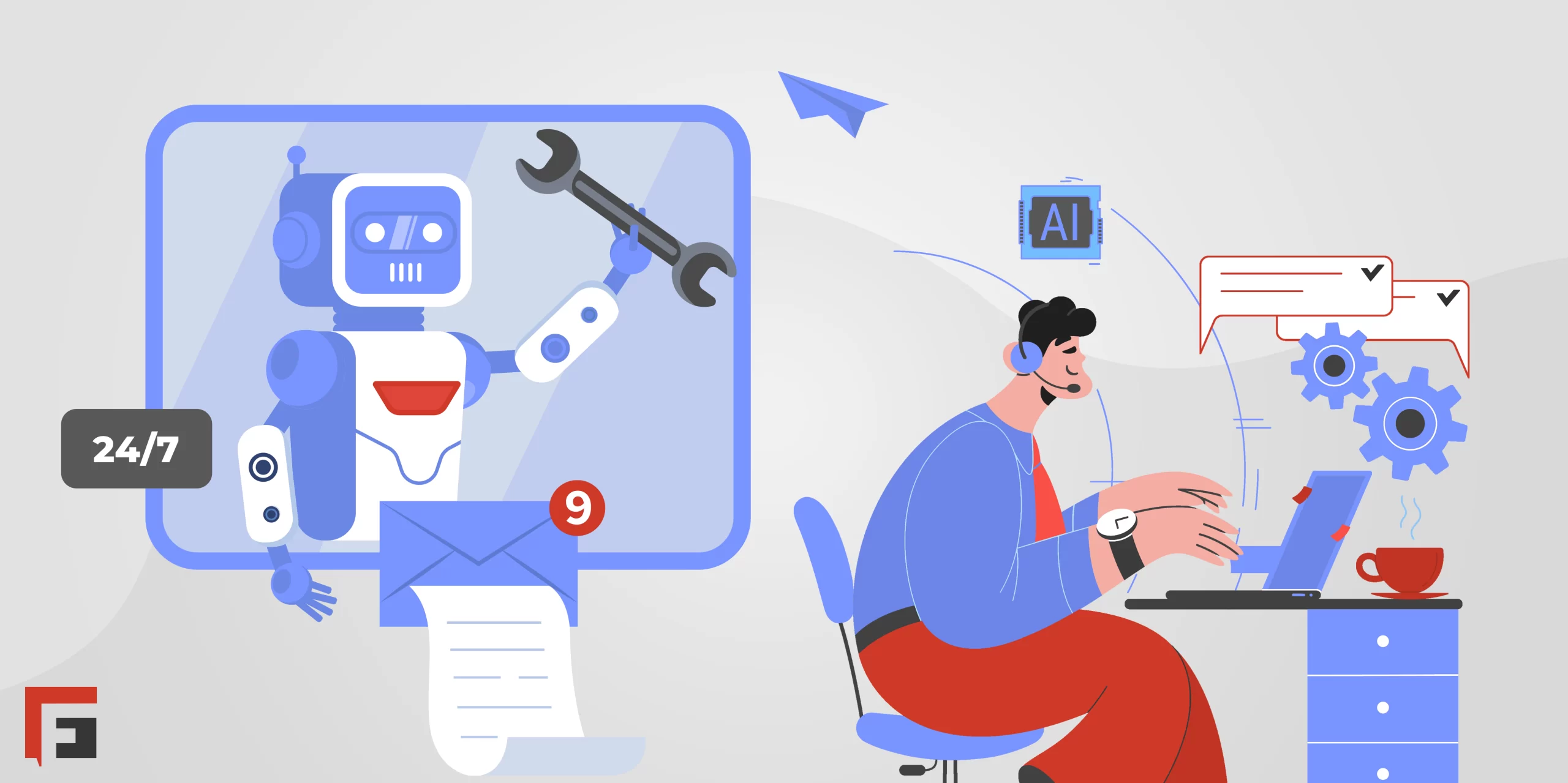
AI Trends in 2025: The Impact on Technical Support Services
| Author: | Hagar Hadad |
|---|---|
| Last updated: | |
| Categories: | Technical Support |
| Reading time: | 11 mins |
The Role of AI in Technical Support Services
AI is fundamentally changing how technical support services is delivered. By 2025, it’s expected that AI-driven automation will account for a large portion of routine customer inquiries and issues. According to salesforce research, 63% of service professionals say AI will help them serve their customers faster. This shift will help businesses improve efficiency and lead to more consistent and accurate outcomes. AI will help improve nearly every part of the technical support industry, including technical support agents and back-end operations. We’ve gathered some of the major AI trends that are expected in 2025 down below:
1. AI-Powered Chatbots and Virtual Assistants
One of the most significant trends in the technical support services space is the growing reliance on AI-powered chatbots and virtual assistants. They’re already being used in 2024 on a large scale, and in 2025, it is anticipated that these tools will become far more sophisticated and capable of resolving complex issues without any human intervention.
According to Zendesk, 71% of customers believe AI and chatbots help them get faster replies. A customer service provider using AI-driven chatbots can provide immediate responses to customer queries, troubleshooting problems in real-time, and offering personalized recommendations based on a customer’s usage history.
For example, AI chatbots will be able to analyze the customer’s technical issue by accessing previous data, cross-referencing knowledge bases, and suggesting solutions instantly. According to a study by Gartner, 80% of customer interactions will be handled without a human by 2025. These virtual assistants will be a key component of technical support services, enabling companies to offer more efficient solutions while keeping costs under control.
2. Automation and Self-Service Support
AI is facilitating the development of self-service support platforms. By 2025, an increasing number of users will be able to resolve technical issues without ever needing to speak to a technical support agent. AI will power these platforms through self-diagnosing systems that can guide users through troubleshooting processes, suggest relevant solutions, or even generate help tickets for more complex issues.
A technical service company making use of automation can improve customer satisfaction by providing round-the-clock assistance and can reduce operational costs. For instance, customers can access an AI-driven knowledge base that dynamically adapts to their specific issue, improving the chances of first-contact resolution and facilitating technical support services. According to a report by McKinsey, self-service automation solutions are expected to reduce the volume of inbound queries by 40% by 2025.
3. Predictive Analytics for Proactive Support
AI-powered predictive analytics is set to change the nature of customer support services. In 2025, technical support outsourcing providers will use AI to predict when an issue may arise based on a customer’s usage patterns, device performance, or software updates. By identifying potential problems before they occur, businesses can provide proactive solutions to their customers, often before the customer even realizes there is an issue. This method also helps prevent downtime, which can be very annoying for users.
Predictive analytics can also empower customer support providers offering technical support services to reach out to customers in advance, offering troubleshooting tips, updates, or even automated fixes. This level of foresight will enhance customer loyalty and reduce the need for reactive support calls, improving both operational efficiency and the overall customer experience.
4. Advanced Natural Language Processing (NLP)
The advancements in Natural Language Processing (NLP) are making AI-driven support more intuitive and capable of understanding complex, conversational language. In 2025, technical support services will use NLP to improve AI’s ability to comprehend and respond to customer queries in a more human-like manner. This capability is critical when it comes to resolving issues that require a lot of communication.
AI-powered chatbots and virtual assistants will understand the context of customer questions, picking up on tone, sentiment, and urgency, all while delivering solutions in a way that feels personalized and empathetic. As these NLP systems become more accurate, technical support agents will be freed from handling routine and simple issues, allowing them to focus on more complex cases that require human intervention. This way, customers will feel supported, and more issues will be fixed.
5. AI-Driven Knowledge Management
Another key trend that is shaping the technical support services is the integration of AI with knowledge management systems. As organizations accumulate huge amounts of data and old support tickets, AI can play a crucial role in organizing, retrieving, and presenting relevant information when needed. By 2025, technical service companies will use AI to continuously update and optimize knowledge bases, ensuring that agents and customers always have access to the most up-to-date solutions.
With AI’s ability to analyze past support cases and resolve new issues based on these old data, businesses will be able to provide faster and more effective responses. This development will have significant benefits for customer service providers and technical support agents who rely on knowledge management systems to support customers.
6. AI-Augmented Human Agents
AI is extremely important, but that does not take away from the importance of having human agents in the technical support services field. In 2025, we will see AI tools that augment the capabilities of technical support agents. These systems will provide real-time recommendations, help agents navigate through troubleshooting processes, and suggest solutions based on past interactions and data.
This blend of artificial and human intelligence will enable technical support providers to offer faster, more accurate solutions, with human agents stepping in when necessary. AI will handle routine inquiries, while human agents will focus on providing personalized support for more intricate or emotionally charged issues. This dynamic approach will lead to a higher quality of service and improved customer satisfaction.
The Impact of AI on Technical Support Services in 2025
As AI technologies continue to evolve, the benefits for businesses operating in the technical support services industry will be substantial. Let’s take a closer look at how AI is set to transform technical support businesses in 2025:
Cost Reduction
One of the most immediate and significant impacts of AI in technical support will be cost reduction. AI can automate routine tasks, freeing up human agents to focus on more complex issues. This shift will reduce the need for large customer service teams, lowering labor costs for technical support providers and customer support providers. Additionally, AI can enhance BPO tech support companies’ ability to scale their operations without the need for proportional increases in staff, which will eventually lead to cost reduction.
Increased Efficiency
AI can handle large volumes of support requests simultaneously, which would be impossible for human agents to manage. By 2025, technical support services will be able to handle more queries, process more data, and resolve issues more quickly with the assistance of AI. This increased efficiency will help businesses improve their service delivery, resulting in shorter wait times for customers, more rapid issue resolution, and increased customer satisfaction.
Enhanced Customer Satisfaction
AI can enhance the customer support provider experience by offering quick, personalized responses and proactive issue resolution. With the rise of AI-powered chatbots, 24/7 support, and self-service options, customers will be able to access assistance at any time of day, improving their overall satisfaction with the service. Additionally, the ability of AI to provide relevant solutions based on data will result in higher-quality support experiences and better technical support services.
The Effect of AI on Technical Support Agents
While AI is set to take over many aspects of technical support, the role of technical support agents will not disappear. Rather, their responsibilities will evolve. The integration of AI in technical support services represents a huge opportunity. Not only can it reduce operational costs and improve service delivery, but it can also enhance the customer experience by providing faster, more accurate, and personalized support.
By 2025, technical support providers will need to invest in training programs for their agents, ensuring they have the skills to work alongside AI tools. These agents will be empowered by AI’s capabilities and will use the tools to enhance their own performance, providing more effective and efficient technical support services for customers.
How FlairsTech Can Help You
When it comes to delivering exceptional technical support services, FlairsTech stands out as a leading customer service provider that combines the best of human expertise with cutting-edge AI technology.
We boast an impressive 98% Customer Satisfaction (CSAT) Score, a clear testament to the quality and efficiency of their support services. With a 97% SLA Success Rate, the company consistently meets and exceeds customer expectations, ensuring that issues are resolved promptly and within agreed-upon timeframes.
Moreover, our First-Time Resolution (FTR) Rate of less than 20 minutes means that customers are more likely to get their issues solved on the first contact, reducing frustration and improving overall customer experience.
We also maintain a 95% Quality Score, reflecting our commitment to maintaining high service standards. FlairsTech’s 97% Agent Utilization Rate demonstrates its efficient use of resources, ensuring that each customer interaction is handled by a skilled technical support agent offering technical support services with minimal delays.
In addition, we offer AI-powered contact quality monitoring systems that analyze customer interactions in real-time, providing instant, tailored tech support solutions. These AI tools allow for continuous improvement of support quality by identifying areas where agents can improve and providing them with actionable insights. With AI-driven quality monitoring at the core of its service offerings, FlairsTech ensures that its technical support services are both highly efficient and personalized, offering customers rapid and accurate resolutions to their technical issues. If this interests you, schedule a call and one of our agents will reach out to you to help achieve your goals within your budget!
Frequently Asked Questions
- What are technical support services?
Technical support services refer to assistance provided to customers or businesses for solving technical issues related to products or services. These services typically involve troubleshooting, providing guidance, and resolving hardware or software issues. Technical support providers offer support through various channels, including phone, email, live chat, and on-site visits. They also use advanced tools such as AI-powered chatbots and remote desktop support to quickly address customer concerns and enhance service efficiency.
- How does AI improve technical support services?
AI improves technical support services by automating routine tasks, enhancing customer interactions, and providing more accurate solutions. AI-powered tools like chatbots, virtual assistants, and predictive analytics enable businesses to offer faster responses, 24/7 support, and personalized experiences. AI also helps in quality monitoring of customer interactions, providing real-time feedback and improving the efficiency of technical support agents.
- What does SLA success rate mean in technical support services?
An SLA success rate in technical support services refers to the percentage of support tickets or issues that are resolved within the timeframe specified in the service level agreement (SLA). A high SLA success rate, such as 97%, indicates that the technical support provider is consistently meeting or exceeding the agreed-upon service timelines. SLAs are important because they ensure that customers can rely on quick responses and timely resolutions, which is crucial for businesses that depend on fast, uninterrupted service.
- Can AI improve customer satisfaction (CSAT) for technical support?
AI plays a significant role in improving customer satisfaction (CSAT) in technical support services. By automating routine tasks, AI ensures that customers get quick and accurate responses, reducing wait times and increasing overall efficiency. With features like AI-powered chatbots, customers can instantly get answers to common technical queries. AI also allows for personalized support by analyzing past interactions and recommending solutions based on the customer’s history.
- How can AI-powered quality monitoring improve technical support services?
AI-powered quality monitoring systems analyze customer interactions in real-time to ensure that technical support agents are providing high-quality service. These systems can automatically detect patterns, identify areas for improvement, and offer actionable feedback to agents.
- How can AI-driven tools improve agent productivity in technical support services?
AI-driven tools significantly improve agent productivity in technical support services by automating routine tasks, providing real-time recommendations, and streamlining workflows. For example, AI can handle initial customer inquiries, freeing up technical support agents to focus on more complex issues. AI also helps agents by offering instant access to knowledge bases and past customer interactions, enabling them to resolve problems more efficiently.
- How can AI in technical support reduce operational costs for businesses?
AI in technical support services plays a key role in reducing operational costs by automating repetitive tasks, streamlining workflows, and improving efficiency. By using AI-powered chatbots, businesses can handle a significant portion of routine customer queries without the need for human intervention, reducing the number of live agents required. This allows companies to focus their resources on more complex issues that require human expertise.

